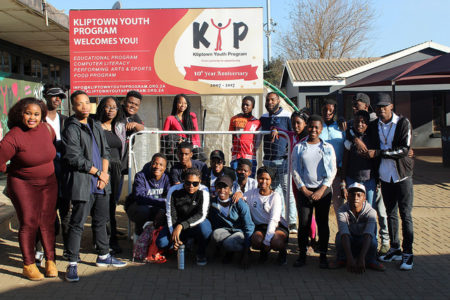 Friday, June 29 – While spending time in Johannesburg, I have experienced so much positivity working with youth at an organization called the Kliptown Youth Programme (KYP). The youth of KYP invited us into their community and showed us the love and hospitality that plays a huge role in South African culture. Throughout my experience with KYP, I learned that South African and American cultures have their differences. However, they share a lot of similarities as well; such as personalities and support systems at home.
Friday, June 29 – While spending time in Johannesburg, I have experienced so much positivity working with youth at an organization called the Kliptown Youth Programme (KYP). The youth of KYP invited us into their community and showed us the love and hospitality that plays a huge role in South African culture. Throughout my experience with KYP, I learned that South African and American cultures have their differences. However, they share a lot of similarities as well; such as personalities and support systems at home.
On the second day that I spent with KYP, my peers and I executed a privilege walk. The purpose of the privilege walk was to compare and contrast the lives of Americans and South Africans. During the walk, we learned about the many challenges the families in Kliptown face. Some of the challenges includes broken homes, substance abuse, and lack of income, which is similar to the challenges families in America face. This privilege walk helped me realize that poverty and the social issues that come along with poverty have an impact on communities around the world; not just in America.
The culture of Kliptown differs from the American culture in terms of fashion, food, and dancing. However, KYP made me realize that we are all equal and that we are family despite our differences. I feel like we are all brothers and sisters, although our cultures differ from one another. We all bleed the same blood and need to care for each other like brothers and sisters. Being able to learn the names of the youth at KYP, words and phrases from the languages they speak, and being invited into the homes of others was a very insightful. It was a mind-boggling experience for me.
 Having conversations with the youth of Kliptown about the same things I talk to my friends back home about says a lot about youth worldwide. “I can’t believe we have so much in common,” was a statement made by one of my KYP peers. Talking to my KYP peers was nothing like I imagined before participating in this trip. Youth in the US focus a lot on social media and less on human interaction. Youth in South Africa share the same focus but, they are a lot more family-oriented. Taking care of the elderly and the kids is an essential role of households in South Africa. This is more of a priority in the South African culture, compared to the American culture.
Having conversations with the youth of Kliptown about the same things I talk to my friends back home about says a lot about youth worldwide. “I can’t believe we have so much in common,” was a statement made by one of my KYP peers. Talking to my KYP peers was nothing like I imagined before participating in this trip. Youth in the US focus a lot on social media and less on human interaction. Youth in South Africa share the same focus but, they are a lot more family-oriented. Taking care of the elderly and the kids is an essential role of households in South Africa. This is more of a priority in the South African culture, compared to the American culture.
After the privilege walk, majority of my peers and I played Soccer with the younger group of kids at KYP. The other few helped to make food that was common in the US, “Chipotle.” Finally, at the end of the day my peers and I went to eat lunch in the cafeteria of KYP. Over lunch we talked about ourselves and what we had in common with each other, such as sports, number of siblings, and favorite songs.
Traveling to South Africa has changed my perspective of different communities, traditions, and cultures. Prior to traveling to South Africa, I thought that the entire continent of Africa was lacking in economic and intellectual advances. Media shown in the US, advertising specifically, only shows how Africans are suffering, and not at all how they are flourishing. South Africa is actually making substantial progress in becoming a unified nation after apartheid. Leaders are working to advance schools and housing, and to combat gangsterism that is negatively affecting communities in South Africa.
Kris T., Paul Public Charter School

One thought on “LearnServe South Africa 2018, Day 4: How South Africans are Flourishing”
Great article. Thanks for sharing. We are all brothers and sisters.
Natasha